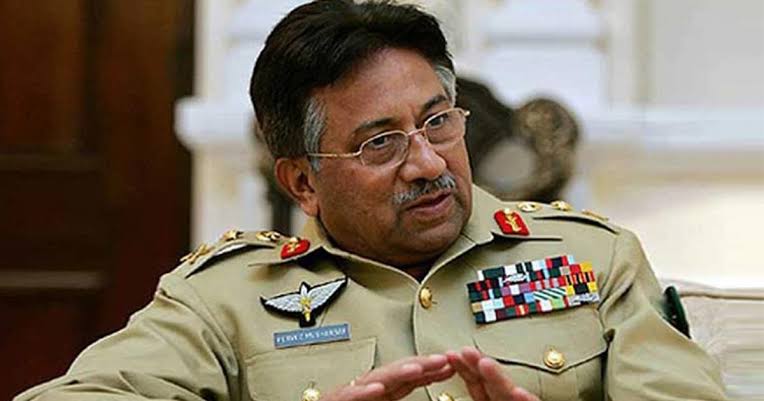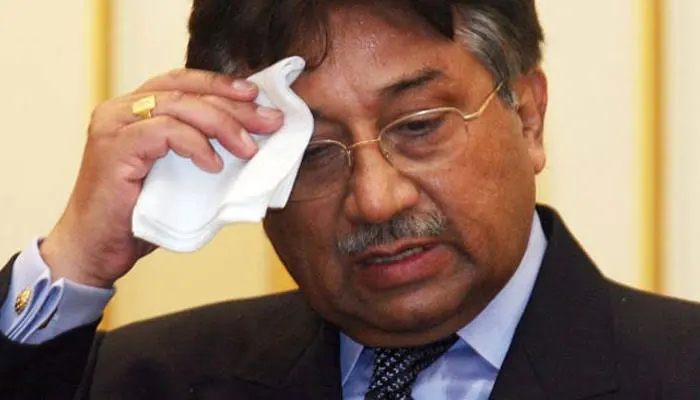
Musharraf as a military leader was very famous in the ranks and files. Known as a liberal and accessible military commander; I found him keen to induct people of Sindh and Baluchistan in the armed forces. He used to take pride in his Sindhi sub-nationality.
Colonel ® Hassan Imam
On Sunday, February 5, as the whole nation was observing the Kashmir Solidarity day, two saddening news were received – one pertained to the bomb blast near Quetta cantonment and the other was the demise of former President and Chief of Army staff General Pervez Musharraf.
Musharraf was though the fourth in succession of the military rulers who reigned while wearing the army uniform, he was the first whose coup d’état did not receive disapproval from the people of Sindh, unlike his predecessors. Pakistan’s national history reflects that the people of Sindh rejected the military rule from the era of Gen Ayub Khan to Gen Ziaul Haq. Sindhis supported Fatima Jinnah against Khan; Zulfiqar Ali Bhutto against Gen Yahya Khan; and Benazir Bhutto against Ziaul Haq.
I remember that day of October 12, 1999, when I was posted in Larkana, the citadel of Bhutto dynasty, when Musharraf overthrew former Prime Minister Mian Muhammad Nawaz Sharif’s government. But condemnation of that coup was hard to find. Rather I had witnessed a wave of happiness and heard the slogans chanting ‘Jeay Musharraf’.
This transition in the political perspective was occasioned by the prejudiced policies of Sharif’s government which used to disregard the provincial mandate and committed economic injustices with the provinces. The people of Sindh are sensitive with regard to the issue of provincial autonomy, water share from the Indus River and control over the natural resources. They considered the policies of Sharif government inimical for their interests.
Moreover, Sharif wanted to install his own army chief who was expected to support his policies as well as the mode of his rule. However, that ploy backfired as the military disapproved of the political intervention.
Sharif’s ouster even got the nod of former PM Benazir Bhutto who was quoted by the international media blaming Sharif for violating all the norms and laws. “Usually coups take place against democratic leaders. Here, a coup has taken place against an unpopular despot who was hounding the press, the judiciary, the opposition and the foreign investors. And, when he decided to divide the army, the last institution left, the army reacted.”
Musharraf as a military leader was very famous in the ranks and files. Known as a liberal and accessible military commander, he frequently interacted with all the ranks. On many occasions of his visits to Sindh, I found him open and accessible. He would attentively respond to suggestions sometimes with acceptance and appreciation.
He used to take pride in his Sindhi sub-nationality
I found him keen to induct people of Sindh and Baluchistan in the armed forces. Once, I wrote him a personal letter highlighting the services of my grandfather who had mobilized the Sindhi youth from Larkana to join the British Army during the world war I. Making the case of such soldierly skills, I requested him to open an army recruitment center in Larkana division as the soil carried rich history of valour. He appreciated the idea and enforced the National Army Recruitment Policy. Resultantly, a record 20,000 youth from Sindh was inducted in the army in a small period of just two years. This Musharraf’s contribution will be remembered and praised in the time to come.
He used to take pride in his Sindhi sub-nationality. His water vision was also appreciable. He led the national campaign for construction of water reservoirs. Musharraf withstood the pressures from Punjab for construction of the controversial Kala Bagh dam. He had declared that he would never support a project which might compromise national security and provincial rights. He had asked the experts to plan other water reservoirs instead of remaining fixated with that controversial dam.
Even after his death, his personality and leadership are drawing tribute and appreciation. Shashi Tharoor, former Indian Minister and Under Secretary General in United Nations, writer of over two dozen books in his tribute to Musharraf said “once an implacable foe of India, he became a real force for peace 2002-2007. I met him annually in those days at the United Nations and found him smart, engaging and clear in his strategic thinking, Rest in Peace”. Of many, the BBC world India’s correspondent Soutik Biswas credited Musharraf, recalling that in 2001, the former president believed the time had come to “turn over a new leaf” in rebuilding the broken relationship between India and Pakistan. The nuclear-armed rivals had fought two wars and a limited conflict over the disputed region of Kashmir. Peace was elusive along the de-facto border dividing Kashmir between the two neighbors. Musharraf recounted in his memoir that he found the “opportunity of a thaw” after the massive earthquake in India’s Gujarat in early 2001. The Delhi-born general telephoned then Indian prime minister Atal Behari Vajpayee to offer condolences and send relief, including medicines. “That broke the ice and led to an invitation for a meeting to visit India,” Biswas remembered. According to him, “many experts considered Musharraf’s 2006 four-point plan on Kashmir to break the deadlock with India pragmatic. However, India was always divided about Musharraf”.
Vajpayee’s foreign minister Jaswant Singh was to recollect that Musharraf had muddied the waters by holding an informal breakfast meeting with Indian journalists on the morning of his crucial meeting with Vajpayee. Some participants had recorded the off-the-record interaction, and the videos made their way to Indian news networks. “A private meeting was turned into a public spectacle,” one editor who attended the meeting said; Musharraf surprised Vajpayee at a regional summit in Nepal when he moved to the front of the table and offered his hand to Vajpayee “who was left with no choice but to stand and accept it”.
He believed the “handshake had the desired effect” as Vajpayee visited Pakistan for a summit meeting in January 2004, and the two sides decided to move the peace process forward.
 Unfortunately, Musharraf’s Balochistan Policy was a fiasco
Unfortunately, Musharraf’s Balochistan Policy was a fiasco
Michael Kugelman, deputy director of the Asia Program at the Wilson Center, a Washington-based think tank, said “One can talk about Musharraf’s unrelenting hostility towards India, as evidenced by his policies and diverted aid from the US, all in an effort to target India. But let’s not forget that he also arguably came closer than any Pakistani leader to make peace with India”. The counterfactuals are tempting, Kugelman says further, If there had been no terror attacks on Mumbai in 2008 and no pro-democracy movement that ousted Musharraf from power in 2007, he could have well co-authored a peace deal with India. “In that case, we’d be having very different conversations about Musharraf’s legacy than we do today.”
Unfortunately, Musharraf’s Balochistan Policy was a fiasco. He did not take the military tiers in confidence and consulted only the politicians. Even his best companions like his closest comrade and former Corps Commander Lt Gen Abdul Qadir Baloch and late Mir Zafarullah Jamali, former Prime Minister, regretted his approach in Balochistan. One of his corps commanders complained to his military colleagues that the chief ignored him all the time and that he was not even aware of his visits to Quetta. His most trustworthy general, and ex-Chief of General staff, Shahid Aziz, also mentioned the same in an interview to a news channel. Nevertheless, Musharraf built roads in Gwadar which the successive governments have failed to maintain.
Musharraf led the country through the catastrophic earthquake in 2005 and the floods in 2007. He established the National Disaster Management Authority, replicating the modern concept of handling the disaster from the developed world.
His initiatives for the freedom of the media and issuing licenses to the private news and entertainment channels is also remembered as democratic step. We hope that the present military and political leaderships will learn lessons from his services as well as his mistakes.
__________________
Colonel ® Hassan Imam is the former Head, Inter Services Public Relations (ISPR) Karachi Sindh.
[The views expressed by the author are his personal and do not reflect the editorial policy of Sindh Courier]